7、南极条约秘书处工作人员条例
国际公法单选题

一国的部分领土脱离母国,建立一个或一个以上的新的国家被称为()。
答案(D)A:独立B:合并C:解体D:分离以下使馆人员在接受国享有完全的外交特权与豁免()。
答案(A)A:使馆的外交人员B:服务人员C:领事D:行政人员确立南极法律制度的基本条约是()。
答案(D)A:保护南极环境条约B:保护南极海豹条约C:海牙公约D:南极条约海岸同属一个国家,湾口宽度超过两岸领海宽度,沿海国在长期的历史中对其主张并连续行使主权且得到国领海海湾际社会的默认的海湾,叫做()。
答案(D)A:领海海湾B:内海湾C:国际海湾D:历史性海湾国际海底区域的资源属于()答案(C)A:自由占领B:自由开发C:人类共同继承财产D:国家专属区下列哪个组织的总部设在伯尔尼( )。
答案(C)A:国际电信联盟B:世界气象组织C:万国邮政联盟D:世界知识产权组织关于国际法与国内法的关系,()主张二元论平行说。
答案(A)A:奥本海B:左恩C:凯尔森D:孔慈蒙特利尔公约中关于"使用中"的界定是()。
答案(B)A:从航空器为起飞而启动时起,倒着陆滑跑完毕为止B:从地面人员或机组为某一特定飞行而对航空器进行飞行前的准备时起,直到降落后24小时止C:从地面人员或机组为某一特定飞行而对航空器进行飞行前的准备时起,直到降落后12小时止D:从航空器装载完毕,机舱外部各门均已关闭时起,直至打开任一机舱门以便卸载为止认为一国对其境内的外国人所负的责任以该国对本国人所负的责任为限,这是外国人待遇标准理论中的()主义。
答案(B)A:客观标准主义B:主观标准主义C:平行主义D:世界主义处理国际组织日常工作的常设机构是()。
答案(D)A:决策机关B:执行机关C:协调机关D:行政机关特别使团是()答案(D)A: 国家派往外国的使馆B:派驻国际组织的常驻使团C:外交团D:国家派往别国的临时使团下列哪个法院在审理案件时仅以国家为唯一的诉讼当事人( )。
答案(B)A:国际常设法院B:联合国国际法院C:欧洲联盟法院D:美洲人权法院在联合国内,通过接纳新会员国、中止会员国的权利或开除会员国的决议,是()的职权。
南极条约的主要内容

南极条约的主要内容南极条约是一项国际性的条约,于1961年12月1日在华盛顿签署,旨在确保南极洲地区的和平与科学研究。
该条约规定了一系列重要的内容,以保护南极洲的环境和资源,维护南极洲地区的和平与稳定。
南极条约的主要内容包括以下几个方面:首先,南极条约规定南极洲地区应该用于和平目的。
该条约禁止任何军事活动和核试验,并规定南极洲地区应该成为和平与合作的象征。
这一规定旨在确保南极洲地区不会成为国际冲突的焦点,保障南极洲地区的和平与稳定。
其次,南极条约规定南极洲地区应该用于科学研究。
根据该条约,签署国同意在南极洲地区进行科学研究,并分享研究成果。
这一规定旨在促进科学知识的共享与交流,推动南极洲地区的科学研究与探索。
另外,南极条约规定南极洲地区应该用于环境保护。
根据该条约,签署国同意保护南极洲地区的环境,并采取措施防止环境污染。
这一规定旨在保护南极洲地区的生态系统,维护南极洲地区的生态平衡。
此外,南极条约规定南极洲地区应该用于资源合理利用。
根据该条约,签署国同意合理利用南极洲地区的资源,并禁止任何未经许可的资源开采活动。
这一规定旨在确保南极洲地区的资源得到合理利用,避免资源过度开发导致的环境破坏。
最后,南极条约规定签署国应该加强合作与协调。
根据该条约,签署国同意加强合作与协调,共同管理南极洲地区的事务。
这一规定旨在促进南极洲地区的可持续发展,确保南极洲地区的和平与稳定。
总之,南极条约的主要内容包括和平利用、科学研究、环境保护、资源合理利用和国际合作。
这些内容为南极洲地区的和平与稳定奠定了坚实的基础,也为南极洲地区的可持续发展提供了重要的保障。
希望各签署国能够切实履行南极条约,共同维护南极洲地区的和平与稳定,推动南极洲地区的可持续发展。
南极条约和南极条约体系简介

南极条约和南极条约体系简介南极条约是一项关于南极地区管理的国际协议,于1959年12月1日在南极洲首都罗斯海的美国科学工作者联合综合考察队基地签署,正式于1961年6月23日生效。
目前,全球共有54个国家签署了南极条约。
南极条约旨在保护南极地区的环境和生态系统,并规定南极大陆只能用于和平目的,禁止任何军事行动。
该条约规定,南极洲属于全人类共同的遗产,所有国家都有义务保护南极大陆及其周边海域的环境,以及南极的科学研究。
同时,该条约特别强调了国际合作的重要性,号召各国进行合作,发挥各自的优势,共同保护南极地区的环境和生态系统。
除了南极条约外,南极还有其他补充协议和安排,构成了完整的南极条约体系:1. 《环境保护协定》(1991年):该协定是对南极条约的补充,旨在确保南极洲的生态系统得到有效保护。
根据协定,南极地区的任何活动都必须受到环境评估的检查,以确保不会破坏南极的环境或生态系统。
此外,协定还规定了严格的废物管理和清理要求,包括限制进口和出口任何有害物质。
2. 《全面禁止核试验条约》(1996年):该条约旨在全面禁止核试验,并加强国际核监督机构的力量,以确保世界上所有核试验都得到禁止。
3. 《南极海洋活动和保护协定》(1982年):该协定确保了南极海洋的保护和管理,并规定了各国在南极海域的活动应遵守的法规。
4. 《南极旅游管理协定》(1991年):该协定旨在管理南极旅游业,确保不会破坏南极环境、生态系统和文化遗产。
5. 《南极水文研究协定》(1983年):该协定旨在促进南极洲海洋和冰水环境的研究,并鼓励国际合作。
协定规定,各国应当共享其水文学数据,并在南极洲的研究活动方面开展合作。
总之,南极条约体系包括南极条约和其他规定和协定,它们共同旨在保护南极洲、南极海洋和周边环境、生态系统和文化遗产,以及鼓励国际合作,在南极洲的可持续发展和科学研究方面取得更进一步的进展。
南极条约体系的实施得到了全球各国的普遍认可,成为保护全球环境和文化遗产的典范之一。
南极条约

∙第一条 - 南极应只用于和平目的,一切具有军事性质的措施均予禁止;∙第二条 - 自由的南极科学调查和为此目的而进行的合作应继续;∙第三条 - 在科考信息及科考人员上实现自由交换;∙第四条 - 冻结一切对南极的领土要求,并禁止新的领土要求;∙第五条 - 禁止在南极地区进行核试验或处理放射性物质;∙第六条 - 规定适用该条约的范围为南纬60°以南的所有陆地和冰架;∙第七条 - 缔约国观察员可自由视察南极一切地区,包括一切驻所、装置和设备及船舶、飞机等运输工具;各缔约国须对即将在南极开展的活动向其他各缔约方提前通知;∙第八条 - 缔约国对各自派出的观察员和科学家行使管辖权;∙第九条 - 在涉及南极的重要问题上,缔约各方应协商一致;∙第十条 - 努力阻止国家和个人做出违反《南极条约》的行为;∙第十一条 - 各缔约国对本条约产生的争议应和平解决;∙第十二、十三、十四条 - 有关修改条约、接纳新成员、翻译版本等杂项。
《南极条约》的主要目的是为了保证“为了全人类的利益,南极应永远专为和平目的而使用,不应成为国际纷争的场所和对象”。
条约禁止“一切具有军事性质的措施”,而并非禁止军事人员的存在。
它避免涉及关于某些国家已经提出而其他国家并不承认的对南极地区的领土要求问题。
[3][编辑]其他协议南极条约体系还包括200多项由各缔约国政府批准或在条约协商会议上通过的其他建议和协定,主要包括:∙组织召开一年一度的南极条约协商会议及环境保护委员会会议。
∙根据南极条约及马德里议定书的要求,促进各成员国的信息交流。
∙收集、存档、安排和出版南极条约协商会议档案文件。
∙向公众提供和宣传关于南极条约及南极相关活动的信息。
∙捕获南极哺乳动物或鸟类∙向南极引进非原生动植物∙进入特别保护区或科学考察区∙在南极大陆和海域倾倒、处置污染物∙将一些特定物品从南极带入美国。
国家开放大学电大本科国际公法简答论述题题库及答案c试卷号:1018

国家开放大学电大本科《国际公法》简答论述题题库及答案(C试卷号:1018)一、简答题1.简述南极的法律地位。
答:《南极条约》对南极地区的法律地位作了规定,主要内容有:(1)和平利用南极。
为了全人类利益,各国在南极地区禁止采取一切具有军事性质的措施。
(2分)(2)南极科学考察自由和国际合作。
任何国家都有在南极进行科学考察的自由并为此目的开展国际合作。
(2分)(3)冻结各国对南极的领土和权利要求。
(2分)(4)维持南极地区的公海制度。
条约的规定不应损害或影响任何国家在南极地区根据国际法享有的对公海的权利或行使这些权利。
(2分)2.简述条约的缔结程序。
答:(1)约文的议定。
条约约文的议定通常是通过缔约方派代表进行谈判。
对国家来说,它可以由国家元首、政府首脑或外交部长进行议定约文的谈判,但通常都是由国家的主管当局委派全权代表参加谈判。
(2分)(2)约文的认证。
缔约各方代表议定条约约文之后就进入第二个程序,即认证约文的阶段。
谈判国可以在条约中规定认证的程序,或由参加起草约文的国家约定程序。
若没有规定或约定程序,可采用以下方式:签署、待核准的签署和草签。
(2分)(3)表示同意接受条约拘束。
条约约文经过认证后,进入一个国家最终接受条约拘束的阶段。
只有国家作出同意接受条约拘束的表示,它才是条约的缔约国并能成为当事国,从而受条约拘束。
国家表示接受条约拘束的方式有多种,包括签署、交换构成条约之文书、批准、接受、赞同或加入,或任何其他表示同意之方式。
(2分)(4)交换或交存批准书。
国家以批准、接受、费同或加入的方式表示接受条约拘束,须履行交换或交存其批准书、接受书、赞同书或加入书的程序。
因为这样的文书是缔约国最终表示接受条约拘束的证明。
(2分)3.战争法规定了哪些禁止使用的作战手段和方法?答:现行国际条约规定的禁止使用的作战手段和方法有:(1)禁止使用极度残酷的和过分伤害的武器;(2分)(2)禁止使用不分皂白的作战手段和方法;(2分)(3)禁止使用改变环境的作战手段和方法;(2分)(4)禁止使用背信弃义的作战手段和方法。
中国极地考察队员守则
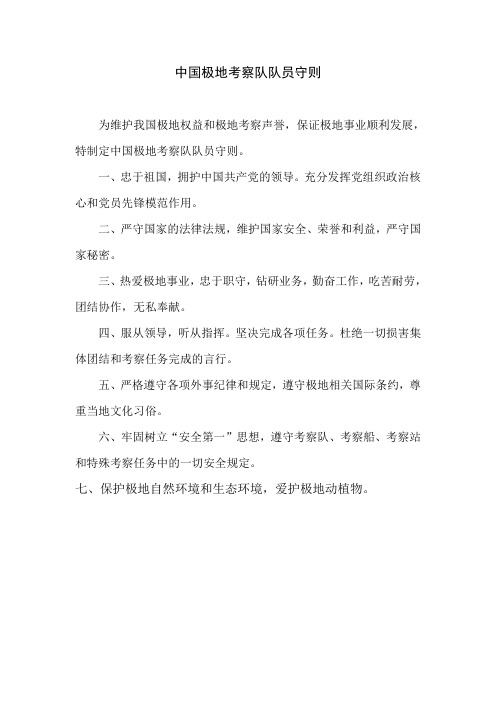
中国极地考察队队员守则
为维护我国极地权益和极地考察声誉,保证极地事业顺利发展,特制定中国极地考察队队员守则。
一、忠于祖国,拥护中国共产党的领导。
充分发挥党组织政治核心和党员先锋模范作用。
二、严守国家的法律法规,维护国家安全、荣誉和利益,严守国家秘密。
三、热爱极地事业,忠于职守,钻研业务,勤奋工作,吃苦耐劳,团结协作,无私奉献。
四、服从领导,听从指挥。
坚决完成各项任务。
杜绝一切损害集体团结和考察任务完成的言行。
五、严格遵守各项外事纪律和规定,遵守极地相关国际条约,尊重当地文化习俗。
六、牢固树立“安全第一”思想,遵守考察队、考察船、考察站和特殊考察任务中的一切安全规定。
七、保护极地自然环境和生态环境,爱护极地动植物。
国际法模拟题

国际法模拟题第一篇:国际法模拟题中国地质大学(北京)继续教育学院2013年03课程考试《国际法》模拟题一.单项选择题1.现代国际法不承认国家有(A)。
A域外庇护权B领土庇护权C领水庇护权D领域庇护权2.(D)不能行使紧追权。
A军舰B 军用飞机C政府船舶D民用商船3.所谓“最惠国待遇”是指(D)的待遇。
A高于本国国民B 等于本国国民C高于第三国国民D 等于第三国国民4.外交团是(A)方面的团体。
A外交礼仪B外交使团 C领事D私人5.现行的国际海底开发制度实行(C)A单一开发制B 协商开发制C平行开发制D 自由开发制6.联合国安理会“五大国一致”原则是在(D)确定的。
A 1941年“大西洋宪章”B 1942年“联合国家宣言”C 1944年华盛顿“橡树园会议”D 1945年“雅尔塔会议”7.过境通行制度适用于(C)A内海B历史性海湾C国际航行的海峡D 群岛水域8.将争端提交由一个若干人组成的委员会。
并由其查明事实。
提出报告和建议促使当事国达成协议。
解决争端的方法称为(D)A 斡旋B 调停C 调查D 和解9.在国际法历史上,最古老的国际法渊源是:(A)A国际习惯B国际条约C一般法律原则D国际法院判例10.当国家参加的国际条约与《联合国宪章》规定的会员国义务发生冲突时,(B)A 国际条约的义务应优先履行B 《联合国宪章》的义务应优先履行C 适用“后法优于先法”的原则D 适用“先法优于后法”的原则11.国际法上的承认在承认国和被承认国之间引起一系列法律效果,因此(D)A 承认仅仅是单方面的行为B 承认意味着建交C承认不具有溯及力D 承认只表明了建交的愿望,并不等于建交12.根据国际实践,排除行为不法性主要有以下几种情形:(A)A事先同意B报复措施C平时封锁D武装干涉13.中国和印度之间的边界属于(A)A 传统习惯边界线B 自然边界线C 确定边界线D 条约边界线14.按照《海洋法公约》的规定,群岛国群岛直线基线最长不得超过(C)A24海里B100海里C125海里D200海里15.庇护权在国际法上(B)A.是个人的权利;B.是国家的权利;C.是个人根据国际法得到的权利;D.是国家的义务。
南极条约的内容
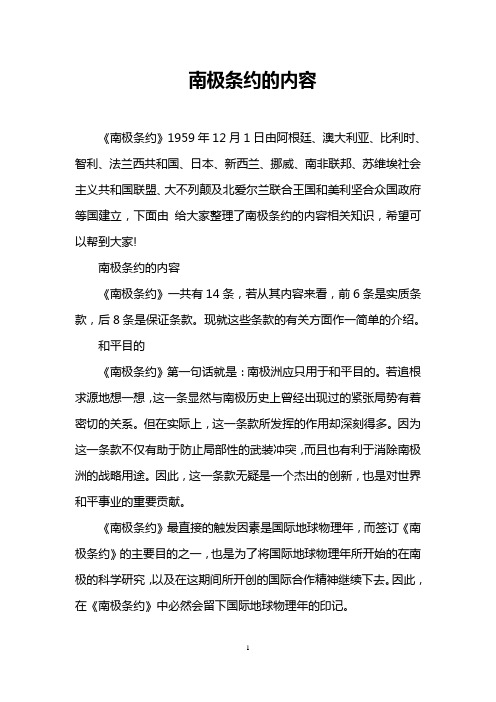
南极条约的内容《南极条约》1959年12月1日由阿根廷、澳大利亚、比利时、智利、法兰西共和国、日本、新西兰、挪威、南非联邦、苏维埃社会主义共和国联盟、大不列颠及北爱尔兰联合王国和美利坚合众国政府等国建立,下面由给大家整理了南极条约的内容相关知识,希望可以帮到大家!南极条约的内容《南极条约》一共有14条,若从其内容来看,前6条是实质条款,后8条是保证条款。
现就这些条款的有关方面作一简单的介绍。
和平目的《南极条约》第一句话就是:南极洲应只用于和平目的。
若追根求源地想一想,这一条显然与南极历史上曾经出现过的紧张局势有着密切的关系。
但在实际上,这一条款所发挥的作用却深刻得多。
因为这一条款不仅有助于防止局部性的武装冲突,而且也有利于消除南极洲的战略用途。
因此,这一条款无疑是一个杰出的创新,也是对世界和平事业的重要贡献。
《南极条约》最直接的触发因素是国际地球物理年,而签订《南极条约》的主要目的之一,也是为了将国际地球物理年所开始的在南极的科学研究,以及在这期间所开创的国际合作精神继续下去。
因此,在《南极条约》中必然会留下国际地球物理年的印记。
《南极条约》的第二条和第三条都是关于科学研究的。
首先必须保证科学研究的自由。
其次,为了促进科学研究和国际合作,则必须保证科学家、研究成果和信息资料的互通有无,自由交换,以及南极条约协商国与其他机构和国际组织的合作。
而所有这些,都是国际地球物理年精神的具体体现。
信息交换对于维持现代社会正常运转来说,是必不可少的,而在南极洲就更是如此。
在《南极条约》中,规定了两种类型的国际信息交换。
一是为了促进国际合作,科学研究数据和研究结果应该互相交换;二是为了同样的目的,同时也是为了使各种活动能取得最大的效益,科学研究的计划也应该互相交换。
当然,所有这些措施都是为了推进科学研究的国际合作。
主权要求条款如果没有主权问题,《南极条约》的必要性也就不很大了,即使要签订某种形式的条约,问题也会简单得多。
南极条约的主要内容
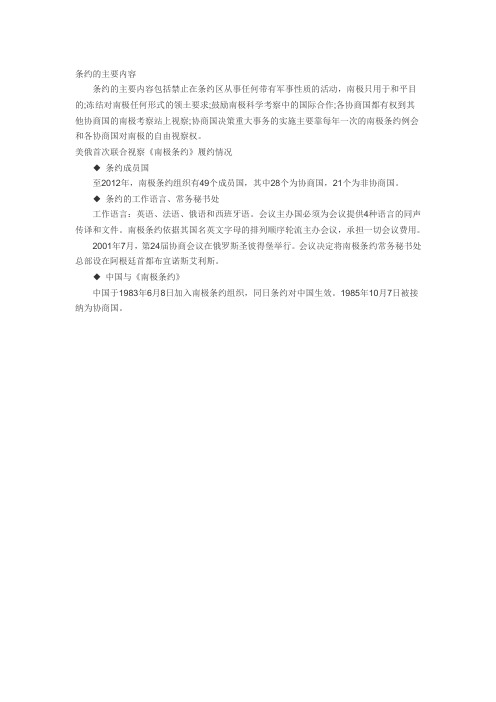
条约的主要内容
条约的主要内容包括禁止在条约区从事任何带有军事性质的活动,南极只用于和平目的;冻结对南极任何形式的领土要求;鼓励南极科学考察中的国际合作;各协商国都有权到其
他协商国的南极考察站上视察;协商国决策重大事务的实施主要靠每年一次的南极条约例会和各协商国对南极的自由视察权。
美俄首次联合视察《南极条约》履约情况
◆条约成员国
至2012年,南极条约组织有49个成员国,其中28个为协商国,21个为非协商国。
◆条约的工作语言、常务秘书处
工作语言:英语、法语、俄语和西班牙语。
会议主办国必须为会议提供4种语言的同声传译和文件。
南极条约依据其国名英文字母的排列顺序轮流主办会议,承担一切会议费用。
2001年7月,第24届协商会议在俄罗斯圣彼得堡举行。
会议决定将南极条约常务秘书处总部设在阿根廷首都布宜诺斯艾利斯。
◆中国与《南极条约》
中国于1983年6月8日加入南极条约组织,同日条约对中国生效。
1985年10月7日被接纳为协商国。
南极条约的名词解释
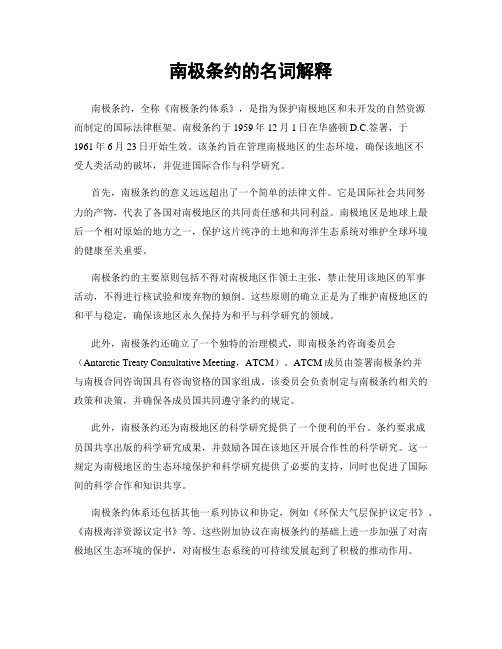
南极条约的名词解释南极条约,全称《南极条约体系》,是指为保护南极地区和未开发的自然资源而制定的国际法律框架。
南极条约于1959年12月1日在华盛顿D.C.签署,于1961年6月23日开始生效。
该条约旨在管理南极地区的生态环境,确保该地区不受人类活动的破坏,并促进国际合作与科学研究。
首先,南极条约的意义远远超出了一个简单的法律文件。
它是国际社会共同努力的产物,代表了各国对南极地区的共同责任感和共同利益。
南极地区是地球上最后一个相对原始的地方之一,保护这片纯净的土地和海洋生态系统对维护全球环境的健康至关重要。
南极条约的主要原则包括不得对南极地区作领土主张,禁止使用该地区的军事活动,不得进行核试验和废弃物的倾倒。
这些原则的确立正是为了维护南极地区的和平与稳定,确保该地区永久保持为和平与科学研究的领域。
此外,南极条约还确立了一个独特的治理模式,即南极条约咨询委员会(Antarctic Treaty Consultative Meeting,ATCM)。
ATCM成员由签署南极条约并与南极合同咨询国具有咨询资格的国家组成。
该委员会负责制定与南极条约相关的政策和决策,并确保各成员国共同遵守条约的规定。
此外,南极条约还为南极地区的科学研究提供了一个便利的平台。
条约要求成员国共享出版的科学研究成果,并鼓励各国在该地区开展合作性的科学研究。
这一规定为南极地区的生态环境保护和科学研究提供了必要的支持,同时也促进了国际间的科学合作和知识共享。
南极条约体系还包括其他一系列协议和协定,例如《环保大气层保护议定书》、《南极海洋资源议定书》等。
这些附加协议在南极条约的基础上进一步加强了对南极地区生态环境的保护,对南极生态系统的可持续发展起到了积极的推动作用。
总之,南极条约是一个具有里程碑意义的国际法律文件,它在维护南极地区生态环境、保护未开发自然资源以及促进国际科学合作等方面发挥了重要作用。
作为全人类的宝贵资源,南极地区需要得到全球各国的共同呵护和保护。
南极条约的主要内容南极条约的体系

南极条约的主要内容南极条约的体系《南极条约》1959年12月1日由阿根廷、澳大利亚、比利时、智利、法兰西共和国、日本、新西兰、挪威、南非联邦、苏维埃共和国联盟、大不列颠及北爱尔兰联合王国和美利坚合众国政府等国建立,确认在南极洲进行科学调查方面的合作对科学知识有重大的奉献。
下面由为大家的南极条约的主要内容,希望大家喜欢!第一条1.南极洲应仅用于和平目的。
在南极洲,应特别禁止任何性,如建立军事基地和设防工事,举行军事演习,以及试验任何类型的武器。
2.本条约不阻止为科学研究或任何其他和平目的而使用军事人员或设备。
第二条有如在国际地球年中所实行的那种在南极洲进行科学调查的自由和为此目的而实行的合作,均应继续,但应受本条约各条款的约束。
第三条1.为了按照本条约第二条的规定促进在南极洲进行科学调查的国际合作,各缔约国同意,在切实可行的最大范围内:(a)进行有关南极洲科学工程方案的情报的交流,使工作能到达最大限度的经济和效率;(b)进行南极洲各队和工作站之间科学人员的交流:(c)进行从南极洲得来的科学观察和成果的交流,并使其能供自由利用。
2.在实施本条时,应从各方而鼓励同对南极洲具有科学或技术的联合国各专门机构及其他国际组织建立合作工作关系。
第四条1.本条约中的任何规定不得解释为:(a)任何缔约国放弃它前已提出过的对在南极洲的领土主权的权利或要求;(b)任何缔约国放弃或缩小它可能得到的对在南极洲的领土主权的要求的任何根据,不管该缔约国提出这种要求是由于它本身或它的国民在南极洲活动的结果,或是由于其他原因;(c)损害任何缔约国关于成认或不成认任何其他国家对在南极洲的领土主权的权利、要求或要求根据的立场。
2 .在本条约有效期间发生的任何行动或活动不得成为提出、支持或否认对在南极洲的领土主权的要求的根据,或创立在南极洲的任何主权权利。
在本条约有效期间,不得提出对在南极洲的领土主权的任何新要求或扩大现有的要求。
第五条1 .禁止在南极洲进行任何核爆炸和处理放射性废料。
gp02 南极条约

gp02 南极条约南极洲保护与管理公约(南极条约)摘要:南极洲是世界上唯一没有主权声索的大陆,由于其重要的科学价值和环境保护需求,1972年南极条约得以签署,成为一项全球性的国际协定。
本文将探讨南极洲保护与管理公约的背景、主要内容和影响,以及未来的挑战和发展机遇。
第一部分:背景介绍南极洲是地球上最干燥且寒冷的地区之一,其丰富的生物和独特的自然景观吸引着世界各国的关注。
然而,为了确保南极洲的生态系统能够继续存在并得到保护,国际社会意识到有必要制定一项具有约束力的国际协定。
因此,南极洲保护与管理公约于1972年签署。
第二部分:南极条约的主要内容1. 和平利用原则:南极洲应当用于和平目的,禁止一切军事活动。
2. 禁止资源开发:公约禁止南极洲的任何资源开发,包括矿产、石油和渔业。
3. 环境保护:公约要求各成员国采取必要的措施,确保南极洲生态系统的完整性和稳定性。
4. 科学研究:公约促进国际合作,鼓励各国开展南极洲的科学研究。
5. 站点检查:公约规定各成员国有责任对南极洲的活动进行监督和检查。
第三部分:南极条约的影响1. 环境保护成果:南极洲成为一个几乎不受人类活动影响的区域,生物多样性得到保护,并且南极洲的气候和水资源状况也受到监控和保护。
2. 国际合作:南极洲保护与管理公约成为国际间合作的典范,各成员国在科学研究、环境保护和应急救援等方面展开合作。
3. 和平稳定:南极洲的和平利用原则帮助维护了南极地区的和平与稳定,避免了可能的冲突和争端。
第四部分:未来挑战与发展机遇1. 气候变化:面临全球气候变化的威胁,南极洲冰盖融化速度加快,公约成员国需共同努力应对气候变化的影响。
2. 可持续发展:南极洲的可持续发展是一个重要的议题,公约的成员国应进一步加强环境保护和资源管理,确保南极洲的生态系统得以持续存在。
3. 国际合作:公约成员国应加强合作,共同推动南极洲的科学研究,分享知识和资源,促进南极洲的可持续发展。
结论:南极洲保护与管理公约(南极条约)是一个具有重要意义的国际协定,为南极洲的环境保护、和平稳定和可持续发展提供了框架和指导。
南极条约保护南极洲的环境与科学合作

南极条约保护南极洲的环境与科学合作南极洲是地球上最为神秘和原始的地方之一,它被冰雪覆盖着,拥有丰富的生物资源和独特的自然景观。
为了保护南极洲的环境,并加强国际间的科学合作,南极条约于1959年签署,成为一项重要的国际公约。
南极条约的起源和目的南极条约的起源可以追溯到20世纪50年代,当时南极洲各国之间开始展开科学研究和探险活动。
为了避免国家间的领土争端和资源争夺破坏南极洲的环境,联合国提出了制定一项南极洲国际政策的建议。
最终,南极条约的起草会议于1959年在华盛顿召开,并在同年12月1日正式生效。
南极条约的主要目的是保护南极洲的环境,确保南极洲不被军事化,并促进国际间的科学合作。
根据南极条约的规定,南极洲只能用于和平目的,禁止任何军事活动。
同时,南极条约还倡导各国在南极洲进行科学研究时的合作与信息交流,共同推进对南极地区的科学探索。
南极条约的核心原则南极条约以一系列核心原则来保护南极洲的环境和促进科学合作。
以下是南极条约的主要原则:1.和平利用:南极洲只能用于和平目的,不得进行任何军事活动。
这一原则确保南极洲的永久和平与稳定。
2.环境保护:各国必须采取措施,保护南极洲的自然环境和生物多样性。
禁止任何可能对南极生态系统和环境造成污染或损害的活动。
3.科学合作:各国在南极洲开展的科学研究应当相互合作和协调。
信息共享和数据交流是南极科学合作的重要方面。
4.禁止资源开发:南极洲不得进行任何形式的矿产资源开发,包括石油、天然气以及其他矿物资源。
这一原则旨在防止资源争夺和破坏南极洲的环境。
南极条约的成员国和运作方式截至2021年,已有54个国家成为南极条约的缔约国,这些国家包括所有主权声索地区的国家以及一些没有声索地区的国家。
南极洲的管理和决策权归南极条约缔约国集会所有,缔约国每年定期召开会议,就南极洲的事务进行讨论和决策。
南极条约还设立了南极洲保护和管理委员会,负责监督南极洲的保护和管理工作。
该委员会的主要职责包括审查和评估各国提出的南极洲计划、制定保护区划和管理措施、监测环境变化等。
南极条约第4条的解读

南极条约第4条的解读
嘿,朋友们!今天咱们来聊聊南极条约第 4 条。
这可真不是一条普通的规定呀!
你看哈,南极那可是个极其特殊的地方,就好像地球上的一块儿神秘宝藏。
南极条约第 4 条就像是守护这块宝藏的规则。
比如说吧,它规定了南极用于和平目的。
这意味着什么呢?就好比一个超级大的公园,大家都能去,但不是去打架争斗的,而是去欣赏去感受的,多棒啊!“那要是有人不遵守这个规定咋整呢?”我听到有人问啦。
对啊,所以这就凸显这条规定的重要性了呀。
再想想,它还确保在南极进行科学研究的自由呢。
这不就像打开了知识的大门嘛!科学家们可以在那里尽情地探索未知,寻找关于地球和宇宙的秘密。
“哇塞,那能发现多少神奇的东西呀!”你瞧,这多让人兴奋。
而且呀,这条规定对于保护南极的环境也起着至关重要的作用呢。
要是没有它,那南极说不定会被破坏得不成样子。
就好像一个美丽的花园,如果没人管,可能就会被践踏得乱七八糟。
“哎呀,那可不行,南极那么美!”
南极条约第 4 条就是这样,看似简单的条文,却蕴含着巨大的意义。
它保障了南极的和平、科学研究和环境保护,让这个地球上最后的纯净之地能够一直保持着它的魅力和价值。
我觉得呀,这条规定真的是太重要啦,它让我们能一直拥有南极这个神奇而珍贵的地方,让我们的子孙后代也能领略到它的风采。
所以呀,我们都要好好地守护这条规定,守护南极!。
国家海洋局办公室关于印发《访问中国南极考察站管理规定》的通知
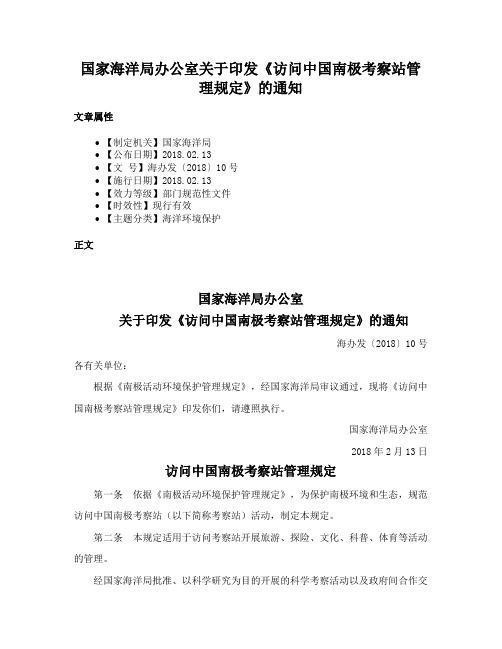
国家海洋局办公室关于印发《访问中国南极考察站管理规定》的通知文章属性•【制定机关】国家海洋局•【公布日期】2018.02.13•【文号】海办发〔2018〕10号•【施行日期】2018.02.13•【效力等级】部门规范性文件•【时效性】现行有效•【主题分类】海洋环境保护正文国家海洋局办公室关于印发《访问中国南极考察站管理规定》的通知海办发〔2018〕10号各有关单位:根据《南极活动环境保护管理规定》,经国家海洋局审议通过,现将《访问中国南极考察站管理规定》印发你们,请遵照执行。
国家海洋局办公室2018年2月13日访问中国南极考察站管理规定第一条依据《南极活动环境保护管理规定》,为保护南极环境和生态,规范访问中国南极考察站(以下简称考察站)活动,制定本规定。
第二条本规定适用于访问考察站开展旅游、探险、文化、科普、体育等活动的管理。
经国家海洋局批准、以科学研究为目的开展的科学考察活动以及政府间合作交流活动不在本管理规定范围之内。
第三条本规定所称考察站是指以科学研究为目的,在南纬60度以南地区设立的包括建筑物、科考场所以及附属设施等组成的考察基地,是国家批准设置的公益性科研单位,主要承担科学考察、业务化观监测、运行维护等任务。
第四条访问考察站活动应以保护南极环境、不影响考察站正常科考和后勤保障工作为原则。
无人值守的考察站不接受访问申请。
第五条原则上应在星期六、星期日和中国法定节假日开展访问考察站活动。
第六条每批次访问考察站人数不超过100人,在站活动时间不超过1小时,每日访问考察站总人数不超过400人。
第七条访问考察站活动应当提前取得国家海洋局同意,在到达考察站前24小时至72小时之内通知考察站,通知考察站时应出示国家海洋局同意访问的批复。
第八条考察站根据国家海洋局的批复及本规定第六条接待访问活动。
因访问人数超出当日总人数或有紧急工作安排导致变更或无法接待的,考察站应予以及时告知。
第九条访问考察站活动期间,应遵循以下要求:(一)遵守《南极活动环境保护管理规定》;(二)服从考察站安排,在指定区域和路线内活动,禁止触碰或损坏考察站设备;(三)禁止使用无人机航拍、禁止使用发射功率大的设备和高噪音设备;(四)禁止携带恐怖主义、极端主义等宣传资料;(五)禁止未经许可在考察站开展商业活动;(六)禁止开展有损公序良俗和国家形象的行为;(七)禁止开展其他违反南极条约法律体系和国内相关规定的活动。
《关于环境保护的南极条约议定书》——《马德里条约》

关于环境保护的南极条约议定书关于环境保护的南极条约议定书(1991年6月23日订于马德里中华人民共和国政府代表于1991年10月4日签署本议定书)序言本南极条约议定书各缔约国,以下简称各缔约国,深信有必要加强对南极环境及依附于它的和与其相关的生态系统的保护;确信有必要加强南极条约体系以确保南极应继续并永远专为和平目的而使用,不应成为国际纷争的场所或对象;牢记南极特殊的法律地位与政治地位以及各南极条约协商国保证使在南极的一切活动符合南极条约的宗旨与原则的特殊责任;忆及为了保护南极环境及依附于它和与其相关的生态系统,将南极确定为特别保护区以及根据南极条约体系所采取的其他措施;进一步确认南极给科学监测与研究具有全球重要性与区域重要性的演变进程所提供的独特机会;重申南极海洋生物资源保护公约的保护原则;深信制订一个保护南极环境及依附于它的和与其相关的生态系统的综合制度是符合全人类利益的;希望为此目的补充南极条约;兹协议如下:第一条定义为本议定书的目的:(a)“南极条约”系指1959年12月1日订于华盛顿的南极条约;(b)“南极条约地区”系指根据南极条约第六条南极条约各项规定所适用的地区;(c)“南极条约协商会议”系指南极条约第九条所指的会议;(d)“南极条约协商国”系指有权委派代表参加南极条约第九条所指的会议的缔约国;(e)“南极条约体系”系指南极条约、根据南极条约实施的措施和与条约相关的单独有效的国际文书和根据此类文书实施的措施;(f)“仲裁法庭”系指根据作为本议定书组成部分的议定书附件而设立的仲裁法庭;(g)“委员会”系指根据第十一条设立的环境保护委员会。
第二条目标与指定各缔约国承诺全面保护南极环境及依附于它的和与其相关的生态系统,特兹将南极指定为自然保护区,仅用于和平与科学。
第三条环境原则1.对南极环境及依附于它的和与其相关的生态系统的保护以及南极的内在价值,包括其荒野形态的价值、美学价值和南极作为从事科学研究,特别是从事认识全球环境所必需的研究的一个地区的价值应成为规划和从事南极条约区一切活动时基本的考虑因素。
南极条约

条约全文
阿根廷、澳大利亚、比利时、智利、法兰西共和国、日本、新西兰、挪威、南非联邦、苏维埃社会主义共和 国联盟、大不列颠及北爱尔兰联合王国和美利坚合众国政府,
承认南极洲永远继续专用于和平目的和不成为国际纠纷的场所或对象,是符合全人类的利益的; 确认在南极洲进行科学调查方面的国际合作导致对科学知识的重大贡献; 深信为继续和发展在南极洲进行有如在国际地球物理年中所实行的那种在科学调查自由的基础上的合作而建 立一个牢固的基础,对于科学和全人类的进步都是有利的: 还深信一项保证南极洲仅用于和平目的和在南极洲继续保持国际和谐的条约,将促进联合国宪章所体现的宗 旨和原则; 议定条款如下: 第一条 1.南极洲应仅用于和平目的。在南极洲,应特别禁止任何军事性措施,如建立军事基地和设防工事,举行军 事演习,以及试验任何类型的武器。
26个国家签署了该公约。签字国将在未来50年内对南极生态保护承担严格的义务。1991年10月4日,中国签 署了该公约。
南极是地球上未被开发、未被污染的洁净大陆,蕴藏着无数的科学之谜和信息。南极科考在地球环境气候、 天文学、地质学、生物学等多项科学领域占有重要地位;南极是地球的共同财富,其蕴藏的丰富资源和能源,对 于科考国具有重要的经济意义;南极科考领域的不断纵深发展,对于实现社会可持续发展,激励民族精神,展示 国家综合实力具有重要的社会和政治意义。
简介
深信为继续和发展在南极洲进行有如在国际地球物理年中所实行的那种在科学调查自由的基础上的合作而建 立一个牢固的基础,对于科学和全人类的进步都是有利的:还深信一项保证南极洲仅用于和平目的和在南极洲继 续保持国际和谐的条约,将促进联合国宪章所体现的宗旨和原则。
该公约1959年12月1日订于华盛顿,1961年6月23日生效。1983年6月8日中华人民共和国政府向美国政府交 存加入书,并自该日起对我国生效。
关于制定《南极法》的议案
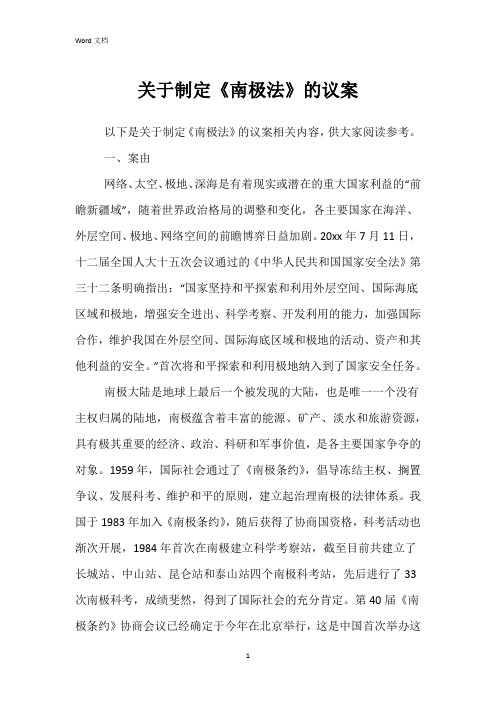
关于制定《南极法》的议案以下是关于制定《南极法》的议案相关内容,供大家阅读参考。
一、案由网络、太空、极地、深海是有着现实或潜在的重大国家利益的“前瞻新疆域”,随着世界政治格局的调整和变化,各主要国家在海洋、外层空间、极地、网络空间的前瞻博弈日益加剧。
20xx年7月11日,十二届全国人大十五次会议通过的《中华人民共和国国家安全法》第三十二条明确指出:“国家坚持和平探索和利用外层空间、国际海底区域和极地,增强安全进出、科学考察、开发利用的能力,加强国际合作,维护我国在外层空间、国际海底区域和极地的活动、资产和其他利益的安全。
”首次将和平探索和利用极地纳入到了国家安全任务。
南极大陆是地球上最后一个被发现的大陆,也是唯一一个没有主权归属的陆地,南极蕴含着丰富的能源、矿产、淡水和旅游资源,具有极其重要的经济、政治、科研和军事价值,是各主要国家争夺的对象。
1959年,国际社会通过了《南极条约》,倡导冻结主权、搁置争议、发展科考、维护和平的原则,建立起治理南极的法律体系。
我国于1983年加入《南极条约》,随后获得了协商国资格,科考活动也渐次开展,1984年首次在南极建立科学考察站,截至目前共建立了长城站、中山站、昆仑站和泰山站四个南极科考站,先后进行了33次南极科考,成绩斐然,得到了国际社会的充分肯定。
第40届《南极条约》协商会议已经确定于今年在北京举行,这是中国首次举办这一会议,也是国际社会对中国积极参与南极事务的广泛认可。
虽然我国成为南极考察大国,但还称不上南极事务强国,特别是南极立法工作起步晚,进展慢,在处理南极问题时,过分依赖于《南极条约》等国际法规范,使我国在南极事务上显得十分被动,也与我国作为南极考察大国的地位不相称。
为规范、保障、引导我国在南极地区的科学考察,资源开发,旅游,环境保护等活动,推动南极事业发展,维护国家利益,向国际社会展示我国是负责任大国的形象,需要加快制定南极法。
二、案据1.制定南极法有利于增强我国在南极事务上的话语权。
- 1、下载文档前请自行甄别文档内容的完整性,平台不提供额外的编辑、内容补充、找答案等附加服务。
- 2、"仅部分预览"的文档,不可在线预览部分如存在完整性等问题,可反馈申请退款(可完整预览的文档不适用该条件!)。
- 3、如文档侵犯您的权益,请联系客服反馈,我们会尽快为您处理(人工客服工作时间:9:00-18:30)。
ANNEX TO DECISION 3 (2003)STAFF REGULATIONS FOR THE SECRETARIAT OF THEANTARCTIC TREATYREGULATION 1Preamble1.1 These Staff Regulations establish the fundamental principles of employment, regulate the working relationships and establish the rights and duties of members of the staff of the Secretariat of the Antarctic Treaty (the Secretariat), and includes the Staff members who render their services in and receive remuneration from the Antarctic Secretariat.REGULATION 2Duties, Obligations and Privileges2.1 Staff members, upon accepting their appointments, shall pledge themselves to discharge their duties faithfully and to conduct themselves solely with the interests of the ATCM in mind. Their responsibilities as staff members are not national but are exclusively owed to the ATCM.2.2 Staff members shall at all times conduct themselves in a manner in keeping with the Antarctic Treaty. They shall always bear in mind the loyalty, discretion and tact imposed on them by their responsibilities in the performance of their duties. They shall avoid all actions, statements or public activities which might be detrimental to the ATCM and its aims.2.3 Staff members are not required to renounce either their national feelings or their political or religious convictions, but must ensure that such views or convictions do not adversely affect their official duties or the interests of the ATCM. Staff members shall uphold the highest standards of efficiency, competence, and integrity. The concept of integrity includes, but is not limited to, probity, impartiality, fairness, honesty, and truthfulness in all matters affecting their work and status.2.4 In the performance of their duties, staff members may neither seek nor accept instructions from any government or authority other than the ATCM.2.5 Staff members shall observe maximum discretion regarding official matters and shall abstain from making private use of information they possess by reason of their position. Authorisation for the release of information for official purposes shall lie with the ATCM or the Executive Secretary, as the case may require.1632.6 Staff members shall, in general, have no employment other than with the Secretariat. In special cases, staff members may accept other employment, provided that it does not interfere with their duties in the Secretariat, and that prior authorisation by the Executive Secretary has been obtained. The ATCM’s prior authorisation shall be obtained in respect of the Executive Secretary.2.7 No staff member may be associated in the management of a business, industry or other enterprise, or have a financial interest therein if, as a result of the official position held in the Secretariat, he/she may benefit from such association or interest. Ownership of non-controlling stock in a company shall not be considered to constitute a financial interest within the meaning of this Regulation.2.8 Staff members shall enjoy the privileges and immunities granted to them under the Headquarters Agreement for the Secretariat of the Antarctic Treaty, pursuant to Article 5 of Measure 1 (2003) of the XXVI ATCM.REGULATION 3Hours of Work3.1 The normal working day shall be eight hours, Monday to Friday, for a total of forty hours per week.3.2 The Executive Secretary shall establish the working hours, and may alter them for the benefit of the ATCM , as circumstances may require.REGULATION 4Classification of Staff4.1 Staff members shall be classified in either of the two following categories:(a) Executive CategoryPositions of high responsibility of an executive nature. These posts will befilled by appropriately qualified professionals, preferably with Universityqualifications or the equivalent. Staff members in this category willbe recruited internationally but only among nationals of ConsultativeParties.(b) General Staff CategoryAll other staff, such as translators, interpreters, technical, administrativeand auxiliary positions. Such staff members shall be recruited in Argentinafrom among nationals of Consultative Parties.4.2 Persons employed under Regulation 11 shall not be classified as staff members.164REGULATION 5Salaries and Other Remuneration5.1 The scale of salaries for staff members in the executive category is attached in Schedule A. The salaries of staff members in the executive category shall be paid in US currency.5.2 The scale of salaries for staff members in the general category is attached in Schedule B. The salaries of staff members in the general category shall be paid in US currency.5.3 For the purposes of these regulations the term ‘dependent’ means:any unsalaried child, who is born of, or adopted by, a staff member, his/herspouse, or their children, who is below the age of eighteen years and whois dependent on a staff member for main and continuing support;(b) any child fulfilling the conditions laid down in paragraph (a) above, butwho is between eighteen and twenty-five years of age and is receivingschool or university education or vocational training;(c) any handicapped child who is dependent on a staff member for main andcontinuing support;(d) any other child who is given a home by and is dependent on a staff memberfor main and continuing support;(e) any member of the family forming part of the household of the staffmember, for whose main and continuing support a staff member is legallyresponsible.5.4 The salaries of staff members in the executive category shall begin at Step 1 of the level at which they are appointed. They shall remain at that level for at least the first year of employment.5.5 The promotion of the Executive Secretary and other staff members from one level to another requires the prior approval of the ATCM.5.6 The Executive Secretary shall seek to make arrangements for any staff member in the executive category whose salary is subject to income tax in his/her home country, to be reimbursed for that tax. Such arrangements shall be made only on the basis that the direct costs of reimbursement are paid by the staff member’s home country. Staff members in the general category will be responsible for the payment of income tax, if any on their salaries in their home country.5.7 Staff members shall receive annual step increases, subject to satisfactory performance of their duties. Step increases shall cease once the staff member has reached the highest step in the level in which he/she is serving.5.8 Only in very special cases, on the proposal of the Executive Secretary and with the approval of the ATCM, may a staff member in the executive category be appointed at a salary higher than Step 1 of the relevant level.1655.9 Staff members in the executive category are not entitled to overtime pay or compensatory leave.5.10 Staff members in the general category required to work more than 40 hours during one week will be compensated:(a) with compensatory leave equivalent to hours of overtime performed; or(b) by remuneration per overtime hour, to be calculated at the rate of time anda half, or if the additional time is worked on a Sunday, or on holidays listedin Regulation 7.8, at the rate of double time.5.11 The ATCM shall pay duly justified representation expenses incurred by the Executive Secretary in the performance of his/her duties within the limits prescribed annually in the budget.REGULATION 6Recruitment and Appointment6.1 In accordance with Article 3 of Measure 1 (2003), the ATCM shall appoint an Executive Secretary and shall establish the remuneration and such other entitlements as it deems appropriate. The Executive Secretary’s term of office shall be for four years unless otherwise decided by the ATCM and the Executive Secretary shall be eligible for reappointment for one additional term. The total length of employment may not exceed eight years.6.2 In accordance with Article 3 of Measure 1 (2003) the Executive Secretary shall appoint, direct, and supervise other staff members. The paramount consideration in the appointment, transfer or promotion of staff members shall be the need to secure the highest standards of efficiency, competence and integrity. Subject to this, due consideration should be given to recruiting Executive staff on as wide a basis as possible from among the nationals of Consultative Parties.6.3 Upon selection, each staff member shall receive an offer of appointment stating:(a) that the appointment is subject to these regulations and to changes whichmay be made to them from time to time;(b) the nature of the appointment including a description of the duties of theposition;(c) the date on which the staff member is required to commence duty;(d) the period of appointment, the notice required to terminate it and theperiod of probation;(e) for executive staff the period of appointment, which shall not exceed fouryears, and which may be renewed in consultation with the ATCM;166(f) the category, level, commencing rate of salary and the scale of stepsincreases and the maximum salary attainable;(g) the allowances attached to the appointment;(h) any special terms and conditions which may be applicable.6.4 Together with the offer of appointment, staff members shall be provided with a copy of these Regulations. Upon acceptance of the offer staff members shall state in writing that they are familiar with and accept the conditions set out in these Regulations.REGULATION 7Leave7.1 Staff members shall be entitled to 25 days annual leave during each working year of service, or for periods of less than a full calendar year at the rate of two work days for each completed month of service. Annual leave is cumulative, but at the end of each calendar year, not more than 15 workdays may be carried over to the following year.7.2 The taking of leave shall not cause undue disruption to normal Secretariat operations. In accordance with this principle, leave dates shall be subject to the needs of the ATCM. Leave dates shall be approved by the Executive Secretary who shall, as far as possible, bear in mind the personal circumstances, needs and preferences of staff members.7.3 Annual leave may be taken in one or more periods.7.4 Any absence not approved within the terms of these Regulations shall be deducted from annual leave.7.5 Staff members who, upon termination of their appointment, have accumulated annual leave which has not been taken shall receive the cash equivalent estimated on the basis of the last salary received to a limit of 30 days.7.6 After 18 months of service the Secretariat shall, in accordance with Regulations 9.3 and 9.4, pay fares to the staff member’s home country on annual leave for internationally recruited staff members and their dependents. Following this, home leave fares shall be granted at two-year intervals provided that:(a) dependants who benefit from this grant have resided at Buenos Aires forat least 6 months prior to travel;(b) it is expected that staff members will return to the Secretariat to continuerendering their services for a minimum additional period of 6 months.1677.7 The possibility of combining travel to home country on leave with official travel in Secretariat service may also be considered provided the functions of the Secretariat are not disadvantaged.7.8 Staff shall be entitled to the holidays celebrated traditionally in Buenos Aires,i.e.:Fixed Holidays1 January New Y ear’s DayHoly ThursdayGood FridayEaster Sunday01 May National Holiday25 May National Holiday9 July National Holiday8 December Immaculate Conception25 December Christmas DayMoveable Holidays02 April National Holiday20 June National Holiday17 August National Holiday12 October National Holiday7.9 If under special circumstances members of the staff are required to work on one of the aforementioned days, or if any one of the above holidays falls on a Saturday or Sunday, the holiday shall be observed on another day to be set by the Executive Secretary, who shall take into account the efficient functioning of the Secretariat.REGULATION 8Social Security8.1 It is a condition of employment that each staff member will contribute to a recognised retirement fund and have adequate medical, hospital, life and disability insurance cover to the satisfaction of the Executive Secretary. Such insurance cover shall include adequate provision for dependents. Staff members shall be responsible for the full payment of contributions to their retirement fund and insurance premiums.8.2 Staff members shall not be granted sick leave for a period of more than three consecutive days and more than a total of seven working days in any calendar year without producing a medical certificate.1688.3 (a) Staff members shall be granted certified sick leave not exceeding 12months in any four consecutive years. The first six months shall be on fullsalary and the second six months on half salary, except that no more thanfour months on full salary shall normally be granted in any period of 12consecutive months.(b) In the event of long term sickness, which prevents a staff member fromcontinuing in their position with the Secretariat, the staff member anddependents shall be entitled to return travel and removal expenses tocountry of origin or former residence at the expense of the Secretariat. 8.4 After six months of employment in the Secretariat staff members shall be entitled to maternity leave. On the basis of medical advice that the confinement will probably take place within six weeks, staff members shall be entitled to be absent from duty until eight weeks after confinement. During this period staff members shall receive full pay and corresponding allowances.8.5 In the event of death of a staff member following illness or surgery not resulting from an accident covered by the appropriate insurance, the right to salary, allowances and other corresponding benefits shall cease on the day on which death occurs, unless the deceased leaves dependents, in which case these shall be entitled to mortality allowances and return travel and removal expenses to their country of origin or former residence at the expense of the Secretariat.8.6 Eligibility of the dependents of a deceased staff member for the payment of return travel and removal expenses shall lapse if the travel is not undertaken within six months of the date of the staff member’s death.8.7 The above mortality allowance for death shall be calculated in accordance with the following scale:Y ears of Service Months of Gross Salary Following Death Less than 3 years 3 months3 years and more, but less than 7 years4 months7 years and more, but less than 9 years 5 months9 years and more 6 months8.8 The Secretariat shall pay for customary and reasonable expenses for shipment of the staff member’s body from the place of death to the place designated by the next of kin.REGULATION 9Travel9.1 Staff members may be required to undertake travel, including international travel, on behalf of the Secretariat. All official travel shall be authorised by the Executive169Secretary in advance within the limits of the budget, and the itinerary and travelling conditions shall be those best suited for maximum effectiveness in the fulfilment of duties assigned.9.2 With regard to official travel, a reasonable travel allowance shall be paid in advance for accommodation and daily living expenses.9.3 Economy class shall be utilised, wherever feasible, for air travel. For journeys over nine hours in flying time, business class may be utilised.9.4 First class may be utilised for land travel, but not for travel by sea or air. 9.5 Following completion of a journey for official purposes, staff members shall repay any travel allowances to which, in the event, they were not entitled. Where staff members have incurred expenses above and beyond those for which travel allowances have been paid, they shall be reimbursed, against receipts and vouchers, as long as such expenses were necessarily incurred in pursuit of their official duties.9.6 On taking up an appointment in the Executive Category staff members shall be eligible for:(a) payment of air fares (or equivalent) and travel allowance for themselves,their spouses and dependents to Buenos Aires;(b) payment of removal costs, including the shipment of personal effectsand household goods from place of residence to Buenos Aires, subjectto a maximum volume of 30 cubic metres or one international standardshipping container;(c) payment or reimbursement of sundry other reasonable expenses relatedto relocation, including insurance of goods in transit and excess baggagecharges. Such payments shall be subject to prior approval by the ExecutiveSecretary.9.7 Staff members who, in the course of their duty, are required to use private motor vehicles for official travel purposes shall, with the prior authorisation of the Executive Secretary, be entitled to receive a reimbursement of the reasonable costs involved. The costs associated with normal daily travel to and from the place of work shall not be reimbursed.REGULATION 10Separation from Service10.1 Staff members may resign at any time upon giving three months notice or such lesser period as may be approved by the Executive Secretary (in the case of staff other than the Executive Secretary) or the ATCM (in the case of the Executive Secretary).17010.2 In the event of a staff member resigning without giving the required notice the Executive Secretary (in the case of staff members other than the Executive Secretary) or the ATCM (in the case of the Executive Secretary) reserves the right to decide whether repatriation expenses or any other allowance shall be paid.10.3 Appointment of staff members may be terminated upon prior written notice at least three months in advance, by the Executive Secretary (and in the case of the Executive Secretary by the ATCM) when this is deemed to be for the benefit of the efficient functioning of the Secretariat due to restructuring of the Secretariat or if it is considered that the staff member does not give satisfactory service, fails to comply with the duties and obligations set out in these Regulations, or is incapacitated for service.10.4 In the event of separation from service with the Secretariat, executive staff members shall be compensated at a rate of one month base pay for each year of service, beginning the second year, unless the cause of termination has been gross dereliction of duties imposed in Regulation 2.10.5 In the event of involuntary termination of the appointment of a general staff member, he/she shall be paid the outstanding amount of his/her appointment except when the Executive Secretary considers that the staff member has not given satisfactory service, fails to comply with the duties and obligations set out in these Regulations, or is incapacitated for service.10.6 On separation from service, an executive staff member shall be entitled to the following:(a) payment of economy class air fares (or equivalent) to the staff member’scountry of origin or former residence, for the staff member and dependentmembers of his/her family; and(b) payment of removal costs, including the shipment of personal effects andhousehold goods from place of residence in Buenos Aires to the countryof origin or former residence, subject to a maximum volume of 30 cubicmetres or one international shipping container.REGULATION 11Temporary Personnel Under Contract11.1 The Executive Secretary may contract temporary personnel necessary to discharge special duties of a short term nature in the service of the Secretariat. Short term shall be defined as a contract lasting less than six months. Such personnel shall be classified as additional help and may be paid on an hourly basis.11.2 Persons in this category may include additional translators, interpreters, typists, and other persons contracted for meetings, as well as those whom the Executive Secretary contracts for a specific task.171REGULATION 12Application and Amendment of Regulations12.1 Any doubts arising from application of these Regulations shall be resolved by the Executive Secretary following consultation with the ATCM.12.2 All matters not foreseen in these Regulations shall be brought to the attention of the ATCM by the Executive Secretary.12.3 These Regulations including the schedules may be amended by a Decision of the ATCM.172Secretariat - Staff Regulations Note: This schedule is no longer valid. The last amendment is attached to Decision 2 (2012)173Secretariat - Staff RegulationsNote: This schedule is no longer valid. The last amendment is attached to Decision 2 (2012) 174。
